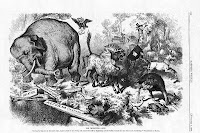
The very mention of the words "good" and "evil" (especially the latter) can invariably be counted upon to set off a spasm of righteous indignation among the relativist left. They will be particularly incensed by what they misperceive as usages that have meaning only in a wholly religious (biblical) context. Because the left is at heart antinomian (1), they eschew and despise any kind of standards to include the norms of traditional civil society (2).
Abstracting from its historical and popular current usage, I take the word "good" to mean anything in the service of human life, liberty, prosperity and general well-being. Similarly, "evil" has the opposite meaning - things that are harmful or destructive to all or any. At a deep, non-verbal level, the concept of good would seem to be essentially linked to survival and avoidance of pain.
In simple societies one can imagine that there is fundamental clarity about what is good and what is not. Existential threats posed by nature, enemies, hunger, sickness and pain are seen as evils; safety, abundance that satisfies basic needs and physical well-being are seen as goods.
But in secure and prosperous societies that have developed technologies capable of control or avoidance of existential threats, the linkage of good and evil to survival tends to become obscure, rationalized and abstract. (3)
I think it is important to see good and evil not only in moral, ethical or religious terms but also in the light of practical efficacy. When, with good intentions stipulated, we embark upon a project to improve our condition, we must first decide if the objective is good, i.e., does it promote life, liberty, prosperity and well-being, and second, whether our methodology for achieving the objective is good by the same standards. If, on the other hand, our methodology causes the project to fall short of its goals, if it wastes resources and if it generates unintended evils, then, our original motivations are irrelevant to the outcomes. Efficacy rather than intent must be the standard.
The Greatest Good for the Greatest Number (4)
Who could argue? But the phrase in inherently problematic. In advanced, pluralistic polities there is great variation in the conception of what is good. How are we to decide? If we decide, how, precisely is it distributed and what is the cost? Do we accept evil to promote the good, and, if so, what calculus enables us to establish a balance? Simpler, though plagued with many of the same difficulties, I lean toward prescribing the least evil for the greatest number.
The least evil may be the "necessary evil" of minimalist government. In return for ceding some liberties to the collective we authorize a popularly supported government to defend us from external threats, enforce our laws and undertake only those tasks that are too large or too expensive to be accomplished by local communities. The least evil for the greatest number.
But what are the consequences if government expands beyond its modest mandate? The bargain to establish the necessary evil of government remains in place, and the growth of government invariably diminishes liberty and undermines the linkage between the popular will and government's priorities.
More precisely to the point, the Western left has, with near-religious zeal, rejected judgment to embrace tolerance, no matter the cost. The willful failure to discriminate -- especially in, but not limited to, matters of moral conduct -- has led to nihilism. To assert that everything is relative is to vitiate one's own argument in its very formulation. Yet those who hold relativist views often cite Jesus' injunction to "judge not...", failing to recognize that the remark was directed only to hypocrites. The most casual sampling of biblical writings reveals that, in fact, honest judgment is a cornerstone of the Judeo-Christian tradition as it was to the Classical one.
The ideas behind good and evil are pretty simple, really, and without much freight -- that is, until they are yoked to the special, controlling purposes of social, political, moral or religious ideologies.
------
1. This word emerges from the exegetical history of the Christian faith, but it is remarkably useful in the analysis of contemporary Western society.
2. The left is tied intellectually to the tradition of Rousseauvian thought, which, like antinomianism, champions wholesale rebellion against traditional standards. Cf. The Awful Specter of Standards.
3. I expand on this idea here.
4. Sometimes called "the greatest happiness principle", it derives from the philosophy of Utilitarianism, most closely associated with Jeremy Bentham and John Stewart Mill. The idea expressed has great intuitive appeal and manages to endure despite its vulnerability to reductio argumentation.
















